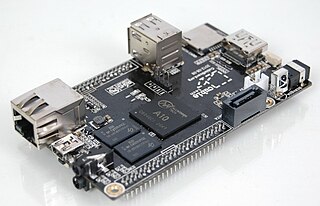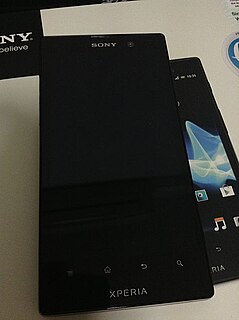The Xbox Development Kit (XDK) is a software development kit created by Microsoft used to write software for the Xbox gaming system. The XDK includes libraries, a compiler, and various tools used to create software for the Xbox. The XDK has the option to integrate itself into Microsoft Visual Studio 2002 or 2003. This is needed if one wants to develop applications or games for the Xbox. The XDK also includes a tool to record in-game footage, which has been widely used to create high-quality screenshots and trailers.

The BeagleBoard is a low-power open-source single-board computer produced by Texas Instruments in association with Digi-Key and Newark element14. The BeagleBoard was also designed with open source software development in mind, and as a way of demonstrating the Texas Instrument's OMAP3530 system-on-a-chip. The board was developed by a small team of engineers as an educational board that could be used in colleges around the world to teach open source hardware and software capabilities. It is also sold to the public under the Creative Commons share-alike license. The board was designed using Cadence OrCAD for schematics and Cadence Allegro for PCB manufacturing; no simulation software was used.

Rockchip is a Chinese fabless semiconductor company based in Fuzhou, Fujian province. Rockchip has been providing SoC solutions for tablets & PCs, streaming media TV boxes, AI audio & vision, IoT hardware since founded in 2001. It has offices in Shanghai, Beijing, Shenzhen, Hangzhou and Hong Kong. It designs system on a chip (SoC) products, using the ARM architecture licensed from ARM Holdings for the majority of its projects.

The ARCHOS 101 Internet Tablet is part of the Archos Generation 8 tablet range, distributed between 2010-11. After a hardware upgrade, it was also part of Generation 9 range sold between 2011-12. It is a 10.1 inch (256.5 mm) Internet tablet with dual-boot capability running Android out of the box.

The Acer Iconia is a range of tablet computers from Acer Inc. of Taiwan.
The Samsung Galaxy R (Royal) (GT-I9103) is an Android smartphone that was announced by Samsung on August 10, 2011 as a variant to the Samsung Galaxy S II.
The IdeaPad tablets from Lenovo was a brand of consumer-oriented tablet computers designed for home use or entertainment, as opposed to the business-focused ThinkPad Tablet series. Devices sold in certain countries, such as China, India and New Zealand, were sold under the LePad brand, similar to the LePhone series of smartphones. IdeaPad-branded tablets have been produced with the Android and Windows operating systems.

CuBox and CuBox-i are series of small and fanless nettop-class computers manufactured by the Israeli company SolidRun Ltd. They are all cube-shaped and sized at approximately 2 × 2 × 2 inches and weigh 91 grams. CuBox was first announced in December 2011 and began shipping in January 2012, initially being marketed as a cheap open-source developer platform for embedded systems.
The Cotton Candy is a very small, fanless single-board computer on a stick, putting the full functions of a personal computer on a device the size of a USB memory stick, manufactured by the Norwegian-based hardware and software for-profit startup company FXI Technologies.

The Allwinner A1X is a family of single-core SoC devices designed by Allwinner Technology from Zhuhai, China. Currently the family consists of the A10, A13, A10s and A12. The SoCs incorporate the ARM Cortex-A8 as their main processor and the Mali 400 as the GPU.

Sony Xperia Ion is an Android smartphone developed and manufactured by Sony Mobile Communications. It was launched at the 2012 Consumer Electronics Show with Sony Xperia S.
The MK802 is a PC-on-a-stick produced by Rikomagic, a Chinese company using mostly two series of Systems on a chip architectures :
Miracast is a standard for wireless connections from devices to displays, introduced in 2012 by the Wi-Fi Alliance. It can roughly be described as "HDMI over Wi-Fi", replacing the cable from the device to the display.

Cubieboard is a single-board computer, made in Zhuhai, Guangdong, China. The first short run of prototype boards were sold internationally in September 2012, and the production version started to be sold in October 2012. It can run Android 4 ICS, Ubuntu 12.04 desktop, Fedora 19 ARM Remix desktop, Armbian, Arch Linux ARM, a Debian-based Cubian distribution, or OpenBSD.

The GameStick is a video game console developed by PlayJam. It is a microconsole the size of a USB flash drive that plugs directly into the back of a TV through an HDMI port and ships with its own Bluetooth controller. Users can download content from a curated storefront via Wi-Fi, with content stored locally for offline access. The device is powered by the PlayJam Games Platform and runs its own version of the Android operating system. It is portable and aimed at casual to mid-core gamers. Like the Ouya, it was funded through Kickstarter.
UDOO is a single-board computer with an integrated Arduino Due compatible microcontroller, designed for computer science education, the world of Makers and the Internet of Things.

Amlogic is an American technology company that was founded in the US as Amlogic Inc. and is predominantly focused on designing and selling SoC integrated circuits. Like most fabless companies in the industry, the company outsources the actual manufacturing of its chips to third-party independent chip manufacturers such as TSMC. Its main target applications as of 2014 are entertainment devices such as Android-based TV and IPTV/OTT set-top boxes, media dongles, smart TVs and tablets. It has offices in Shanghai, Beijing, Shenzhen, Taipei, Hong Kong, and Santa Clara, California.











